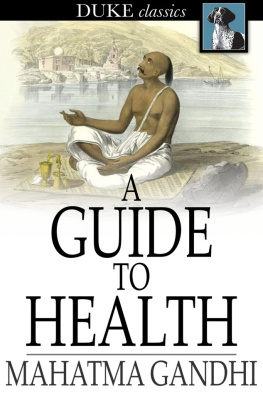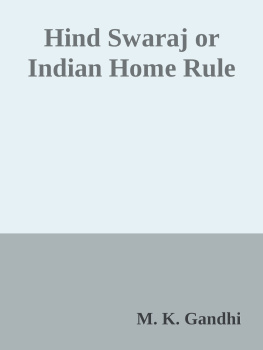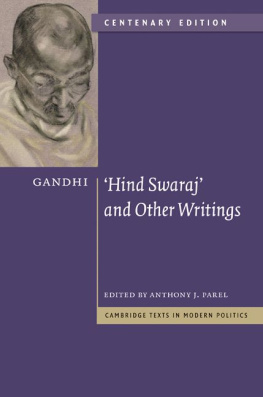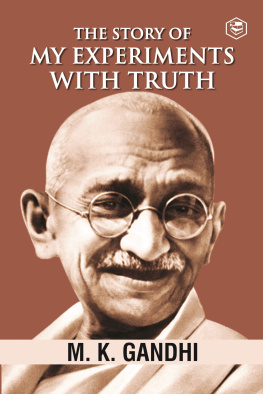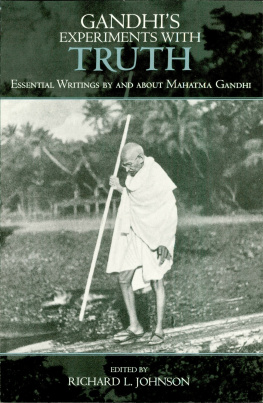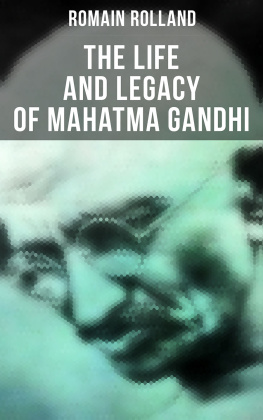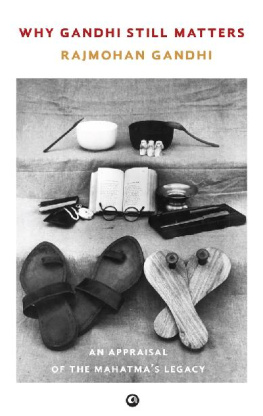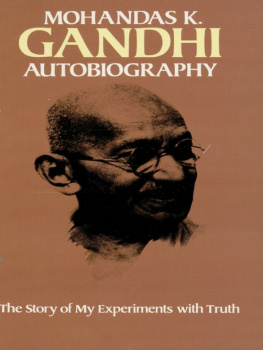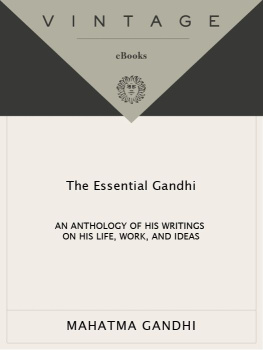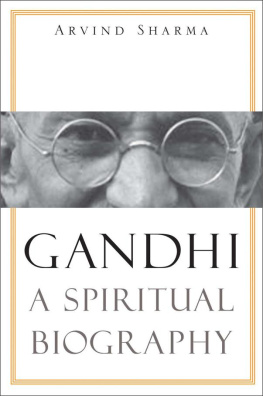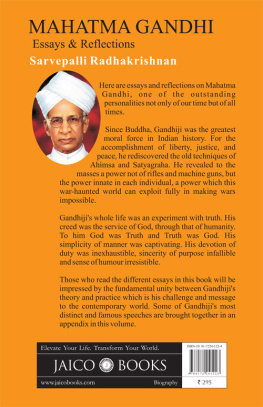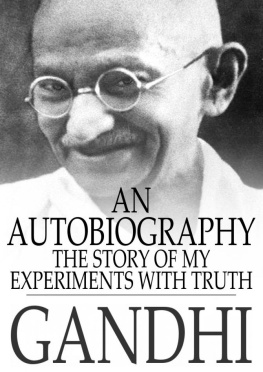Mahatma Gandhi - An Auto biography; Or, the story of my experiments with truth.
Here you can read online Mahatma Gandhi - An Auto biography; Or, the story of my experiments with truth. full text of the book (entire story) in english for free. Download pdf and epub, get meaning, cover and reviews about this ebook. year: 2001, publisher: Penguin Classics- India, genre: Religion. Description of the work, (preface) as well as reviews are available. Best literature library LitArk.com created for fans of good reading and offers a wide selection of genres:
Romance novel
Science fiction
Adventure
Detective
Science
History
Home and family
Prose
Art
Politics
Computer
Non-fiction
Religion
Business
Children
Humor
Choose a favorite category and find really read worthwhile books. Enjoy immersion in the world of imagination, feel the emotions of the characters or learn something new for yourself, make an fascinating discovery.

- Book:An Auto biography; Or, the story of my experiments with truth.
- Author:
- Publisher:Penguin Classics- India
- Genre:
- Year:2001
- Rating:3 / 5
- Favourites:Add to favourites
- Your mark:
- 60
- 1
- 2
- 3
- 4
- 5
An Auto biography; Or, the story of my experiments with truth.: summary, description and annotation
We offer to read an annotation, description, summary or preface (depends on what the author of the book "An Auto biography; Or, the story of my experiments with truth." wrote himself). If you haven't found the necessary information about the book — write in the comments, we will try to find it.
An Auto biography; Or, the story of my experiments with truth. — read online for free the complete book (whole text) full work
Below is the text of the book, divided by pages. System saving the place of the last page read, allows you to conveniently read the book "An Auto biography; Or, the story of my experiments with truth." online for free, without having to search again every time where you left off. Put a bookmark, and you can go to the page where you finished reading at any time.
Font size:
Interval:
Bookmark:
PENGUIN BOOKS
An Autobiography
Mohandas Karamchand Gandhi was born in 1869 at Porbandar in western India. In 1888 he went to London to study law, qualifying in 1891, where he encountered liberal and Christian ideas, and the teachings of Tolstoy. Returning to India, he practised law there until 1893 when he left for South Africa. The Transvaal governments discriminatory policy led him to campaign for the rights of the Indian community using the method of passive resistance, which he called Satyagraha truth force. Gandhi returned to India in 1915 and in 1925 he became President of the Indian National Congress. His first major clash with the British government came in 1919 over the Rowlatt Acts. He introduced the hartal, a strike during which the people devoted themselves to prayer and fasting. When this resulted in violence he left politics for a time and travelled throughout India to teach his main principles: HinduMuslim unity, the abolition of untouchability, and the promotion of hand-spinning. He wore a homespun cotton dhoti and shawl, which won the peoples hearts, and he became known as Mahatma the great soul. Gandhi was imprisoned many times, which, with his hunger strikes, badly affected his health. In 1934 he resigned as leader of the Congress, although he remained a powerful influence, and he became leader again for a short time in 194041. Gandhi continued to campaign against partition, until he realized its inevitability. However, on Independence Day, 15 August 1947, he refused to celebrate and spent the day fasting and in prayer. In 1948 in Delhi he began a fast to the death for peace between the two warring communities. But this had aroused hostility amongst the militant section of the Hindus and on 30 January 1948, one of them shot Gandhi dead.
Gandhis life of non-violence was perhaps the most remarkable life of the twentieth century, lived as it was during the most violent era in human history, and his influence has spread across the globe from Martin Luther King to Nelson Mandela to Aung San Suu Kyi. All his life he held to two fundamental principles, Ahimsa, non-violence, and Satya, truth. He said: My uniform experience has convinced me that there is no other God than Truth. And if every page of these chapters does not proclaim to the reader that the only means for the realization of Truth is Ahimsa, I shall deem all my labour to have been in vain.
Sunil Khilnani is Professor of Politics at Birkbeck College, University of London. His publications include Arguing Revolution: The Intellectual Left in Postwar France (1993), The Idea of India (Penguin, 1998) and (with Sudipta Kaviraj) Civil Society: History and Possibilities (2001), and he is currently writing a biography of Jawaharlal Nehru.
M. K. GANDHI
OR
THE STORY OF MY EXPERIMENTS WITH TRUTH
Translated from the original Gujarati
by
MAHADEV DESAI
With an Introduction by Sunil Khilnani

PENGUIN BOOKS
Published by the Penguin Group
Penguin Books Ltd, 80 Strand, London WC2R 0RL, England
Penguin Putnam Inc., 375 Hudson Street, New York, New York 10014, USA
Penguin Books Australia Ltd, 250 Camberwell Road, Camberwell, Victoria 3124, Australia
Penguin Books Canada Ltd, 10 Alcorn Avenue, Toronto, Ontario, Canada M4V 3B2
Penguin Books India (P) Ltd, 11 Community Centre, Panchsheel Park, New Delhi 110 017, India
Penguin Books (NZ) Ltd, Cnr Rosedale and Airborne Roads, Albany, Auckland, New Zealand
Penguin Books (South Africa) (Pty) Ltd, 24 Sturdee Avenue, Rosebank 2196, South Africa
Penguin Books Ltd, Registered Offices: 80 Strand, London WC2R 0RL, England
www.penguin.com
First published in Gujarati and in English by the Navajivan Publishing House
in two volumes; Volume 1, 1927, Volume 2, 1929
First published in Great Britain by Penguin Books 1982
Reprinted with a new Introduction in Penguin Classics 2001
12
Copyright 1927 and 1929 by The Navajivan Trust
Introduction copyright Sunil Khilnani 2001
All rights reserved
Except in the United States of America, this book is sold subject
to the condition that it shall not, by way of trade or otherwise, be lent,
re-sold, hired out, or otherwise circulated without the publishers
prior consent in any form of binding or cover other than that in
which it is published and without a similar condition including this
condition being imposed on the subsequent purchaser
Gandhis presence in the twentieth century, a century that perfected the art of extermination, is weirdly arresting. His life seems peculiarly unhoused in the violent landscape of his times. How, by what twist of historical fate, did this frail, ungainly man with teapot ears, whose figure wrapped in handspun cloth evoked a faded, archetypal memory of saintliness, wander into the modern world; and how, for a time, did he electrify it? What was he doing there, and what can the trace of his presence mean to us today?
More than fifty years after his assassination in 1948, Gandhi has become a symbol, a myth, even a commodity. Yet we are still far from taking the measure of the twentieth centurys most enigmatic and remarkable personality. Confronted by the vast corpus of his writings and speeches (the Collected Works of Mahatma Gandhi make up a hundred-volume monument), interpreters continue to quarrel, seeing him variously as a spiritual paragon, a wily politician, a psychological and anthropological curiosity, an inventor of political techniques of non-violence and civil disobedience, or as a critic of modernity.
But perhaps a safer clue to understanding Gandhi is to be found in his famous plea: My writings should be cremated with my body. What I have done will endure, not what I have said or written. Gandhi was an artful choreographer of his doings he seemed to know from an early age that he wanted to organize the haphazard trivia of his daily actions into formal order, to give them a shape and meaning. George Orwell, otherwise temperamentally distant from Gandhi, saw exactly the tensed, pageant-like haracter of Gandhis life, and its status as a theatrical parable, when he observed of Gandhi that his whole life was a sort of pilgrimage in which every act was significant. What gave every act its significance was its place in a larger story. Indeed, the most subversive skill of this famously unarmed rebel was his ability to tell stories stories that came entirely to redefine how people perceived themselves, and what they believed they could and could not do.
Nowhere did Gandhi deploy this skill to more powerful effect than when it came to his own life: it enabled him not merely to turn his life into a story, but to live it as a story. That skill is clearly manifest in the book you now hold: a magnificent, puzzling, strenuous act of self-creation, which describes as it enacts the metamorphosis of a fearful, unsuccessful provincial lawyer into a leader who dominated Indias politics for almost four decades, and who took on and successfully defeated the British imperial state.
What drove this transformation was Gandhis capacity for self-creation, or, as he termed it, his fascination with experiments in living. He developed and refined this taste for experiment across the three distinct arenas in which he lived his life: England (where he disembarked at Southampton on a grey September day in 1888, a naive and aspirant nineteen-year-old got up in what he believed were fashionable white flannels); South Africa, his home between 1893 and 1914, where he discovered his capacities to organize and protest, as well as an ability to invent for himself both a personality and a community; and, of course, India itself, where he returned in 1915 to become the moral dynamo and canny political brain of the vast Congress movement that took India to Independence and (to his despair) Partition, in 1947.
Next pageFont size:
Interval:
Bookmark:
Similar books «An Auto biography; Or, the story of my experiments with truth.»
Look at similar books to An Auto biography; Or, the story of my experiments with truth.. We have selected literature similar in name and meaning in the hope of providing readers with more options to find new, interesting, not yet read works.
Discussion, reviews of the book An Auto biography; Or, the story of my experiments with truth. and just readers' own opinions. Leave your comments, write what you think about the work, its meaning or the main characters. Specify what exactly you liked and what you didn't like, and why you think so.

